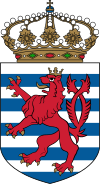The politics of Luxembourg takes place in a framework of a parliamentary representative democratic monarchy, whereby the Prime Minister of Luxembourg is the head of government, and the multi-party system. Executive power is under the constitution of 1868, as amended, exercised by the government, by the Grand Duke and the Council of Government (cabinet), which consists of a prime minister and several other ministers. Usually, the prime minister is the leader of the political party or coalition of parties having the most seats in parliament. Legislative power is vested in both the government and parliament. The judiciary is independent of the executive and the legislature.
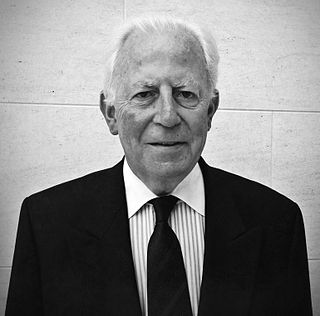
Jacques Santer is a Luxembourg politician who served as the 9th President of the European Commission from 1995 to 1999. He served as Finance Minister of Luxembourg from 1979 until 1989, and the 20th Prime Minister of Luxembourg from 1984 to 1995, as a member of the Christian Social People's Party, which has been the leading party in the Luxembourg government since 1979. As Prime Minister of Luxembourg he also led the negotiations on the Single European Act, which effectively set aside the 20-year-old Luxembourg Compromise.

The Christian Social People's Party, abbreviated to CSV or PCS, is the largest political party in Luxembourg. The party follows a Christian-democratic ideology and, like most parties in Luxembourg, is strongly pro-European. The CSV is a member of the European People's Party (EPP) and the Centrist Democrat International (CDI).

The Luxembourg Socialist Workers' Party, abbreviated to LSAP or POSL, is a social-democratic, pro-European political party in Luxembourg.

The Democratic Party, abbreviated to DP, is the major liberal political party in Luxembourg. One of the three major parties, the DP sits on the centre to centre-right, holding moderate market liberal views combined with a strong emphasis on civil liberties, human rights, and internationalism.
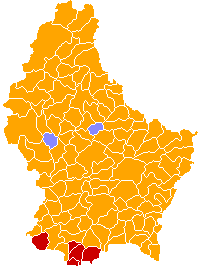
General elections were held in Luxembourg on 13 June 2004, alongside European Parliament elections. The ruling Christian Social People's Party (CSV) of Prime Minister Jean-Claude Juncker won the election, increasing its number of seats to its highest since before 1989 and its share of the vote to levels not seen since the 1959 election.

Lydie Polfer is a Luxembourgish politician who has served in a number of capacities, including Deputy Prime Minister, Minister for Foreign Affairs, and Mayor of Luxembourg City, as well as a Member of the European Parliament (MEP) and a member of the Chamber of Deputies. She is a member of the Democratic Party (DP).
Elections in Luxembourg are held to determine the political composition of the representative institutions of the Grand Duchy of Luxembourg. Luxembourg is a liberal representative democracy, with universal suffrage guaranteed under the constitution. Elections are held regularly, and are considered to be fair and free.

The Alternative Democratic Reform Party is a national-conservative and populist political party in Luxembourg. It has four seats in the sixty-seat Chamber of Deputies, making it the fifth-largest party.

General elections were held in Luxembourg on 13 June 1999, alongside European Parliament elections. The Christian Social People's Party remained the largest party, winning 19 of the 60 seats in the Chamber of Deputies. It formed a coalition government with the Democratic Party.

General elections were held in Luxembourg on 12 June 1994, alongside European Parliament elections. The Christian Social People's Party remained the largest party, winning 21 of the 60 seats in the Chamber of Deputies. It continued the coalition government with the Luxembourg Socialist Workers' Party.
General elections were held in Luxembourg on 15 December 1968. The Christian Social People's Party (CSV) remained the largest party, winning 21 of the 56 seats in the Chamber of Deputies.

The Juncker–Polfer Ministry was the government of Luxembourg between 7 August 1999 and 31 July 2004. It was led by, and named after, Prime Minister Jean-Claude Juncker and Deputy Prime Minister Lydie Polfer.

For elections in the European Union, Luxembourg is a constituency of the European Parliament, currently represented by six MEPs. It covers the member state of Luxembourg and uses the D'Hondt method.
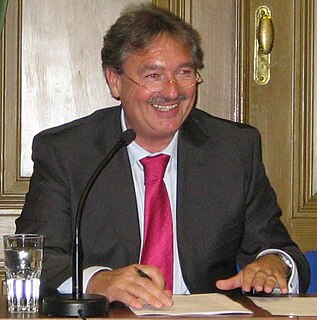
The 2009 European Parliament election in Luxembourg was the election of the delegation from Luxembourg to the European Parliament in 2009. It was held on the same day as the elections to the national legislature, the Chamber of Deputies.
General elections were held in Luxembourg on 7 June 2009, together with the 2009 election to the European Parliament. All sixty members of the Chamber of Deputies were elected for five years. The polls were topped by the Christian Social People's Party, which built upon its already high number of seats to achieve a commanding victory, with the highest vote share and number of seats of any party since 1954. Incumbent Prime Minister Jean-Claude Juncker, who is longest serving head of government in the European Union, renewed the coalition agreement with Deputy Prime Minister and Luxembourg Socialist Workers' Party leader Jean Asselborn and formed the Juncker-Asselborn Ministry II, which was sworn-in on 23 July 2009.
Patrick Santer is a Luxembourgish lawyer and politician for the Christian Social People's Party (CSV).

Early general elections were held in Luxembourg on 20 October 2013. The elections were called after Prime Minister Jean-Claude Juncker, at the time the longest serving head of government in the European Union, announced his resignation over a spy scandal involving the Service de Renseignement de l'Etat (SREL). The review found Juncker deficient in his control over the service.
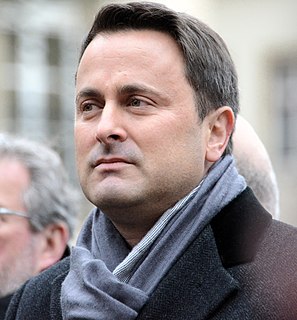
The First Bettel–Schneider Ministry was the ruling government of Luxembourg from 4 December 2013 to 5 December 2018. It was led by Prime Minister Xavier Bettel and Deputy Prime Minister Étienne Schneider. It was formed on 4 December 2013, after the 2013 election to the Chamber of Deputies. The government was a traffic light coalition between the Democratic Party (DP), the Luxembourg Socialist Workers' Party (LSAP), and The Greens. It was succeeded by Bettel–Schneider Ministry II in December 2018.

General elections were held in Luxembourg on 14 October 2018. All 60 seats of the Chamber of Deputies were elected.
